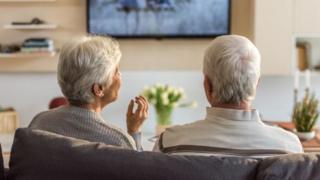TV licences: Call for government and BBC to save free over-75s licences
The proposed means-testing system for the over-75s is an “absurd situation”, MPs say in a report. …

 Image copyright Getty Images
Image copyright Getty Images The BBC and the government should find a way to save free TV licences for all over-75s, a committee of MPs has said.
The media select committee said the current position where only those claiming pension credit are eligible is an “absurd situation”.
The BBC said it will continue to scrap free TV licences for up to 3.7m people.
A government spokesman said: “We’re disappointed with the BBC’s decision not to continue free licences for the over 75s.”
He added: “We’ve been clear that we want and expect it to continue this concession. Taxpayers want to see the BBC using its substantial licence fee income in an appropriate way to ensure it delivers for UK audiences. We will respond to the select committee report in due course.”
‘Flawed’ on both sides
However Sir David Clementi, chairman of the BBC, said the committee recognised there was no “automatic assumption” that the BBC would continue to bear the cost of the free TV licences.
MPs also said there was “clear evidence” the BBC’s funding model was at risk as young people switch to online services.
“Behind closed doors” negotiations over licence fee funding – which led to the June 2019 decision to end free licences for many over-75s from next year – were “flawed” on both sides, the Digital, Culture, Media and Sport Committee said.
BBC director general Tony Hall was criticised in the committee’s report for his handling of the 2015 negotiations.
MPs said he failed to seek the formal agreement of his executive board before recommending to the BBC Trust the deal struck with the government, and that the BBC should have communicated earlier that it would not be able to fund all the free licences from 2020.
The committee also said the government was wrong to “bounce” the BBC into accepting a deal, adding the corporation put itself in an “invidious position” as an administrator of welfare benefits.
The BBC had initially agreed in 2015 to take on responsibility for funding the scheme by 2020, as part of the charter agreement, which sets out the arrangements for the governance of the BBC.
Getty Images
£745mEstimated cost to the BBC of current scheme by 2021/22
£250mEstimated cost of new scheme depending on take-up
190,000people consulted on the change
52%in favour of reforming or abolishing free licence scheme
However, under the new rules announced by the BBC in June, only low-income households where one person receives the pension credit benefit will still be eligible for a free licence.
Funding free TV licences for all over-75s would have resulted in “unprecedented closures”, the BBC said in June.
‘False reassurances’
The MPs’ report said: “It is clear from the correspondence between the government and the BBC in 2015 that there was no automatic assumption that the BBC would continue to bear the costs of a blanket licence fee exemption for over-75s.”
Damian Collins, chairman of the committee, said: “The BBC and the government must reach an agreement to allow the funding of free licence fees for the over 75s to continue after 2020.”
He added the BBC was suffering for having made “a deal done behind closed doors”.
The report also said it uncovered a “disturbing picture” of the overall finances of the BBC, as the income from the licence fee fails to keep pace with the cost of production.
It said that the “rapidly changing viewing habits of younger audiences” moving away from broadcast TV to online and on demand channels “poses a further threat to BBC licence fee revenue in the future”.
“We are seeing clear evidence that the funding model of the BBC will become unsustainable without substantial increases in commercial revenue from BBC Studios and new subscription on demand viewing services like Britbox,” it said.
The report criticised “poor management, leadership and governance at the BBC”, which it blames for issues such as the tax dispute that affected several presenters.
And it said there was “still a long way to go” in resolving the gender pay gap, although there was some evidence the BBC is continuing to work to resolve it.
‘Different way of doing things’
Sir David Clementi added: “There is also clear recognition from the committee that it would be unsustainable for the BBC to take on the full cost of all these free licences alone.”
He said the committee “made clear that the value of the licence fee will continue to be under pressure from inflation in the TV sector.”
“The committee say that the government’s process in 2015 was flawed and we agree with this; it was never a process the BBC would have chosen,” he added.
“That’s why there must be a different way of doing things in the future.”
Follow us on Facebook, on Twitter @BBCNewsEnts, or on Instagram at bbcnewsents. If you have a story suggestion email entertainment.news@bbc.co.uk.




